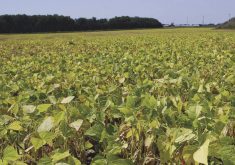Virtual trade missions have given access to a wider audience but can’t quite replace the connections forged on in-person trips, say two agriculture industry leaders.
“There’s no way to replace it, in a sense,” said Brittany Dyck, senior manager of canola utilization with the Canola Council of Canada.
“Trade missions, I think, are really about connecting with — it can be customers, associations, government representatives from other countries that are important for our trade,” Dyck said.
Usually this would mean travelling to those countries or bringing government and industry representatives to Canada to meet with Canadian agricultural experts. They might tour farms and processors.
Read Also

Mazergroup’s Bob Mazer dies
Mazergroup’s Bob Mazer, who helped grow his family’s company into a string of farm equipment dealerships and the main dealer for New Holland machinery in Saskatchewan and Manitoba, died July 6 from cancer.
“You’re spending time in transit, you’re sharing meals. You’re really also building friendships along the way,” said Dyck.
This year, as COVID-19 has closed borders, the canola council took trade missions online. In mid-January, it held a virtual mission with representatives of four companies from South Korea.
This included presentations and discussions on canola production, processing and the health and versatility of canola oil, the council said in a news release. They showed videos of Canadian canola farming and processing.
They had some great back-and-forth discussion, Dyck said.
“These companies showed enthusiasm to gain more information on canola quality, reliable supply and the industry’s plans for growth,” she said in a news release.
Digital diplomacy
A plus of the virtual platform — more people from each company or association could attend, said Dyck.
Dean Diaz, CEO of Cereals Canada, agreed.
“It becomes open to everybody,” he said. “It becomes a training tool for the whole company.”
Most years, representatives of Cereals Canada, Canadian International Grains Institute (Cigi) and the Canadian Grain Commission travel from country to country over six to eight weeks, Diaz said. They give seminars on Canadian grain crops and host one-on-one meetings with the companies.
Companies tend to send their top decision makers to these events, he said. Because the Canadian representatives only fly into major cities, it restricts how many people or companies can make the trip from outlying areas.
This year, they hosted six virtual trade missions composed of information seminars and the option to schedule meetings.
In some cases, groups from different countries sat in their labs as teams and listened to the presentations. This allowed information to trickle down into more of the company, said Diaz.
Less interaction
While some of what happens during traditional trade missions can be recreated online, “virtual trade missions will never replace the hands-on experience of visiting another country, and its businesses, factories, and people,” says the Asia Pacific Foundation of Canada, a think-tank on Canada-Asia relations.
“Experiences like public transportation, walking the streets, and eating local foods are impossible to replicate accurately,” the foundation says.
Sharing coffee or a meal builds a bond, said Diaz. “That is what you miss when you don’t have that in-person discussion.”
Diaz said these missions are about training but about putting experts together in a room to solve issues. He described how, after seminars finished, “You would see technical staff huddled up with our experts.”
Those they met with appreciated the online events but asked them to come in person next year if possible, Diaz said.
Dyck said they booked one-on-one meetings and followed up by email where possible. They recognized that online communication was better than none at all.
“I think we’re doing the best with what we’ve got,” she said.
Here to stay?
Despite drawbacks, Dyck and Diaz agreed virtual trade missions will likely provide valuable new ways of communication in the future.
Dyck said the canola council may consider doing both when travel becomes an option. They may be able to connect more often through virtual channels and come in person “when it most makes sense,” she said.
Cereals Canada is also interested to move to a hybrid model, said Diaz. It’s looking at providing informational events online so those who are looking for data or expert opinions can do so conveniently.
Canadian representatives can then travel for one-on-one meetings, to build relationships and have confidential discussions, he said.
“More than a temporary replacement for traditional trade missions during our current global predicament, virtual trade missions can help build awareness of the opportunities in Asia Pacific markets and increase the capacity of up-and-coming Canadian companies,” wrote the Asia Pacific Foundation of Canada.
“As governments and organizations embrace virtual trade missions, we will understand them better: as temporary replacements, as cheap and accessible alternatives, and as smaller components in a broader array of trade promotion strategies,” it said.




















